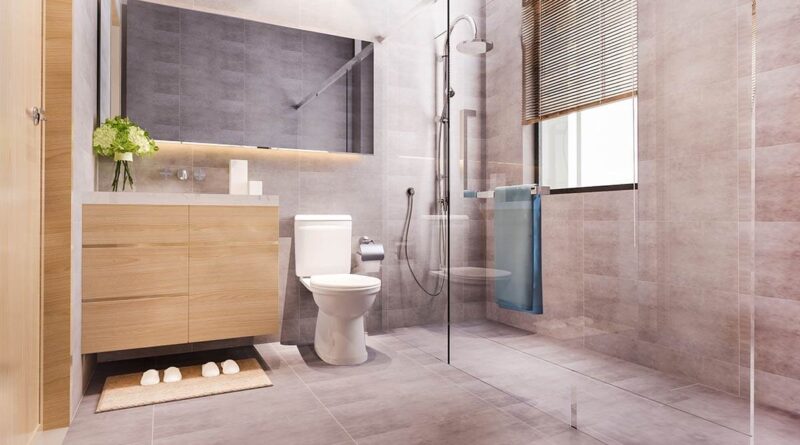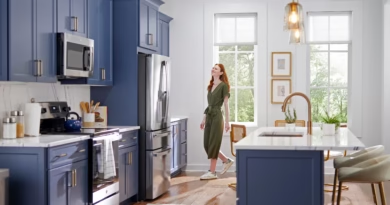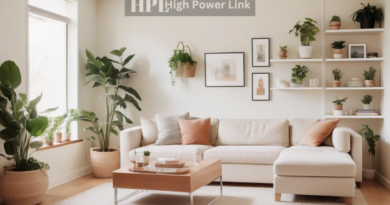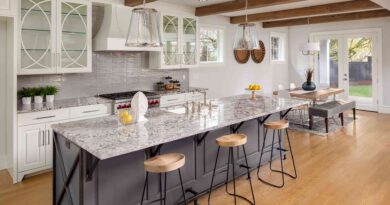Best Materials for Bathroom Renovation in Humid Climates
Renovating a bathroom in a humid climate presents unique challenges. Excess moisture can lead to mold, mildew, and material degradation. Choosing the right materials is essential to ensure durability, functionality, and aesthetic appeal. Below, we explore the best materials for a bathroom renovation in high-humidity environments.
1. Moisture-Resistant Flooring
Flooring is a crucial component of any bathroom, and in humid climates, selecting water-resistant options is a must.
- Porcelain or Ceramic Tile: These tiles are highly water-resistant, durable, and easy to clean. Their non-porous surface prevents water absorption, reducing the risk of mold growth.
- Vinyl Flooring: Available in sheets, planks, or tiles, vinyl is another excellent moisture-resistant option. Luxury vinyl plank (LVP) mimics the look of wood while being completely waterproof.
- Natural Stone: Options like slate and granite are highly durable, but they need proper sealing to prevent water absorption and staining.
- Concrete Flooring: Sealed concrete is resistant to moisture and mold, making it a great option for humid areas.
2. Water-Resistant Walls
Bathroom walls are constantly exposed to moisture and must be protected with suitable materials.
- Cement Board: Used as a substrate behind tiles, cement board is mold-resistant and highly durable.
- Waterproof Paint: Specially formulated paints, such as epoxy or acrylic-based ones, offer additional protection against humidity.
- PVC or Acrylic Panels: These wall panels are non-porous, easy to install, and prevent water damage.
- Glazed Ceramic Tile: Ideal for shower walls, ceramic tiles resist water infiltration when properly grouted and sealed.
3. Durable and Moisture-Resistant Countertops
Countertops should be resistant to humidity and easy to maintain.
- Quartz: Unlike natural stone, quartz is non-porous and does not require sealing. It resists moisture and stains effectively.
- Solid Surface Materials: Made from acrylic and resin, solid surfaces are seamless and highly resistant to moisture.
- Granite or Marble: While aesthetically pleasing, natural stone must be sealed regularly to prevent water absorption.
- Stainless Steel: Though not common, stainless steel countertops are highly resistant to moisture, heat, and bacteria.
4. Humidity-Proof Cabinetry
Bathroom vanities and storage units should be built with materials that resist moisture.
- Plywood with Waterproof Finish: Higher-grade plywood coated with waterproof laminate is more durable than particleboard.
- PVC Cabinets: Fully waterproof and resistant to mold, PVC is an excellent choice for humid climates.
- Marine-Grade Plywood: Designed for wet environments, marine plywood is treated to withstand constant exposure to moisture.
- Stainless Steel or Aluminum Cabinets: Metal cabinetry is highly durable and immune to humidity-induced warping.
5. Mold-Resistant Ceilings
Ceilings are often neglected, but they require careful selection to prevent moisture damage.
- PVC Ceiling Panels: These are lightweight, waterproof, and resistant to mold.
- Moisture-Resistant Gypsum Board: Also known as green board, this material is more resistant to humidity than standard drywall.
- Aluminum Ceiling Panels: Non-rusting and durable, aluminum ceilings work well in humid environments.
6. High-Quality Fixtures and Accessories
Fixtures and accessories should be corrosion-resistant and durable.
- Stainless Steel or Brass Fixtures: These materials do not corrode and can withstand constant exposure to water.
- Tempered Glass Shower Enclosures: Resistant to humidity, tempered glass prevents water spots and mold buildup.
- Anti-Fog Mirrors: Special coatings prevent condensation buildup on bathroom mirrors.
7. Proper Ventilation and Insulation
In addition to using the right materials, proper ventilation and insulation help mitigate humidity issues.
- Exhaust Fans: A high-quality exhaust fan removes excess moisture and prevents mold growth.
- Proper Insulation: Water-resistant insulation, such as closed-cell foam, reduces condensation issues within walls.
- Dehumidifiers: Installing a small dehumidifier in the bathroom can further help in controlling humidity levels.
Conclusion
Choosing the right materials for a bathroom renovation in a humid climate is critical for long-term durability and comfort. Waterproof flooring, moisture-resistant walls, and durable countertops contribute to a functional and aesthetically pleasing space. Additionally, investing in mold-resistant cabinetry, high-quality fixtures, and proper ventilation ensures a long-lasting and maintenance-free bathroom. By selecting the best materials, you can create a stylish, moisture-resistant bathroom that withstands the challenges of a humid climate.





KfL voV ZMaHbAZE smD HBV